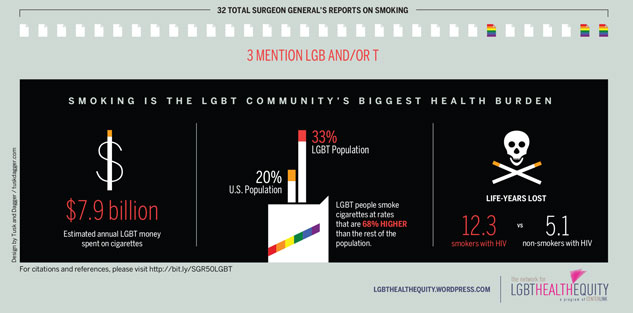A new report from the U.S. Surgeon General reveals that LGBT people spend an estimated $7.9 billion on tobacco products annually — which is 65 times more money than pro-equality funders spend on all LGBT issues combined.

In a press conference at the White House, the surgeon general’s office released its 32nd comprehensive report on the impact of tobacco in the lives of Americans over the past 50 years. The report, titled Health Consequence of Smoking: 50 Years of Progress, examines the health implications of tobacco use in various demographics, but the numbers for LGBT people are particularly striking — especially given the recently uncovered fact that our community smokes at a rate 68 percent higher than the general population. This year’s edition is only the third time the surgeon general’s report has specifically discussed health disparities within the LGBT populance.
“From the surgeon general’s perspective we look at the data,” explains the acting surgeon general, Rear Admiral Boris D. Lushniak, MD, MPH. “People ask where are the disparities now, and we use LGBT as an example of one of those disparities. I’m a man in uniform and this is a war. LGBT smoking is important to us, because the numbers aren’t good. What we need to decide is. What is the best strategic and tactical approach to bring those numbers down?”

The out director of the Network for LGBT Heath Equity at Centerlink: The Community of LGBT Centers, has an idea about where to start in decreasing those health disparities.
“In order to end the epidemic for the LGBT communities we need to break the cycle of smoking in front of our youth, because smoking for us really is a socially transmitted disease,” explains Scout, Ph.D. “When we smoke in packs we’re enticing every person near us to come on over, join the fun, and light up too. Then we need to offer LGBT-welcoming cessation to every person who smokes now. But the first step is clearly knowledge — we have to know it’s our biggest killer before we can fight it. The LGBT community’s health infrastructure is actually excellent. I have great confidence once we take aim at tobacco, we will overcome it.”
Scout points those who are interested in trying to quit tobacco to a helpful tool that shows the financial impact smoking can have on a person’s life. To calculate how much you have spent on smoking since you started and see how much you’ll pay next year, check out Cancer.org’s Smoking Cost Calculator.
“Fixing this health problem isn’t just an issue for those who smoke,” explains Scout. “Until our community organizations include tobacco in their health work, we’re still keeping it in the closet. We need to start a national dialogue among our organizational leaders on tobacco.”
Find more information and read the report for yourself here.

